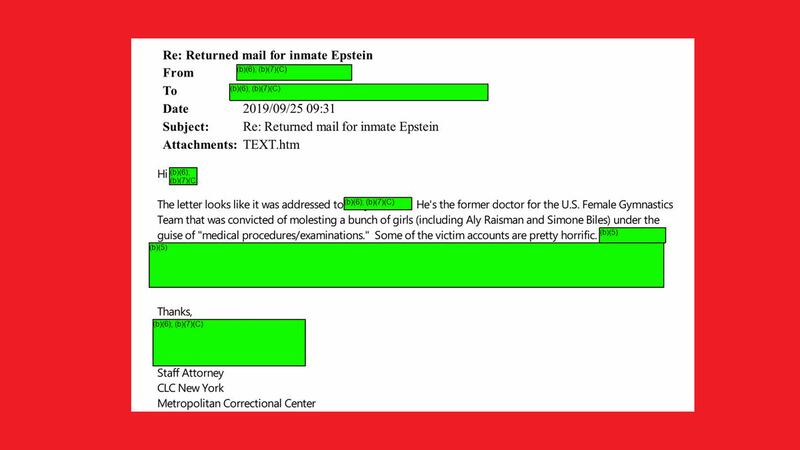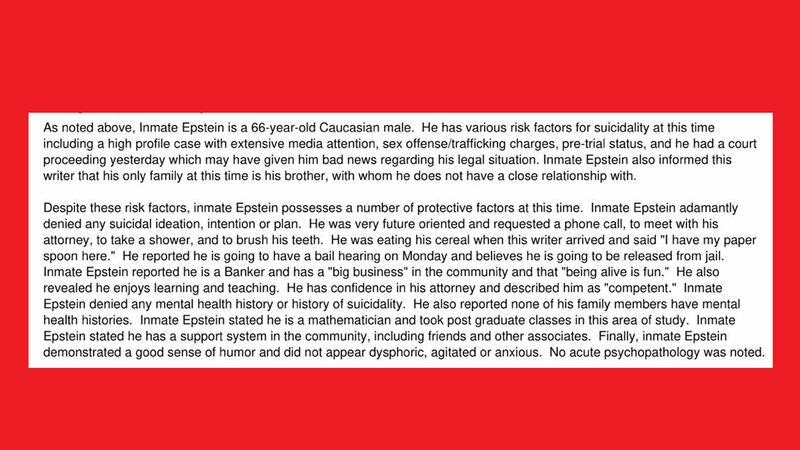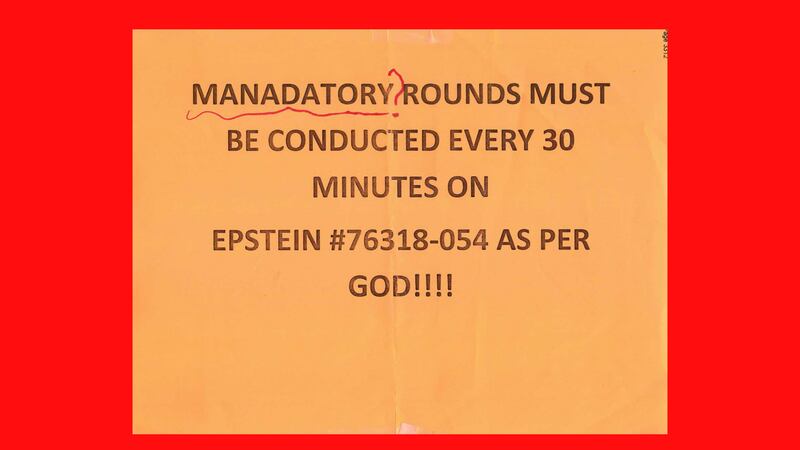Before Jeffrey Epstein’s death in Manhattan federal lockup, he tried sending a letter to convicted child molester Larry Nassar, complained that the FBI had confiscated his CPAP machine, and griped about having to wear an orange jumpsuit that made him look like a “bad guy.”
The revelations come from thousands of pages of records from the federal Bureau of Prisons—obtained by The Daily Beast via a public records request and first reported by the Associated Press—and share a glimpse into Epstein’s world behind bars. On Aug. 10, 2019, Epstein was found dead by suicide inside his Manhattan jail cell, where he was being held pending trial on sex trafficking charges.
In one visit with a psychologist on July 28, 2019, Epstein complained about a toilet in his cell that he claimed flushed for 45 minutes, which he found so aversive he “sat in the corner and held his ears.” He also complained about other loud noises in his Special Housing Unit (SHU) that prevented him from sleeping.
“He said he may have something on the autism spectrum,” his psychologist wrote. “He said in the movie Rain Man the person with autism had an aversion to noise. He stated he is also really good with numbers.”
Around the time, Epstein also complained to staff about the color of his prison jumpsuit. In a July 11, 2019 visit with a psychologist, he protested “wearing an orange jumpsuit and being treated like a ‘bad guy’ when he did not do anything wrong in prison.” He also stated the SHU felt like a “punishment cell.”

“He requested that he be placed in a brown jumpsuit during his legal visits,” the clinical intervention report states. “He was told his concerns would be addressed.”
Just two days after Epstein’s July 6, 2019 arrest for trafficking girls, he signed paperwork indicating he wanted to volunteer for a work assignment “which entails more than housekeeping tasks.” The waiver stated that he was not “aware of any reason why my having contact with convicted prisoners would pose a threat to my safety or the safety of others.”
He apparently tried to contact another high-profile prisoner in the federal system: Larry Nassar, the disgraced USA Gymnastics coach and convicted child molester.
Weeks after Epstein’s death, Metropolitan Correctional Center (MCC) staff discussed the late trafficker’s returned mail. On September 25, 2019, a special investigative technician with MCC wrote in an email that they received returned mail for Epstein. “I am not sure if I should open it or should we hand it over to anyone?” they wrote.
An MCC attorney responded that the letter was addressed to “the former doctor for the U.S. Female Gymnastics Team” and added that the intended recipient “was convicted of molesting a bunch of girls (including Aly Railman and Simone Biles) under the guise of ‘medical procedures/examinations.’” They added, “Some of the victim accounts are pretty horrific.”
Epstein complained of a host of medical conditions while incarcerated. Upon intake, he revealed he had more than 10 female sexual partners in the last 10 years and was treated for chlamydia in 2015. Epstein, however, insisted that he had no other STDs.
He also suffered from sleep apnea, or issues breathing while asleep, and chronic back pain. (At one point, Epstein claimed he had not slept in three weeks because of the apnea.) His most consistent complaint by far was of constipation, which is noted in most of his doctor visits recorded in the documents.

Epstein several times requested that he receive his preferred laxative, Colace, rather than the laxative he was given by the prison, docusate sodium. In a psychological reconstruction of Epstein after his death, a psychologist also noted that Epstein was also prescribed milk of magnesia to aid in his bowel movements.
During one July 30, 2019 medical visit, Epstein complained he’d been without his medications for a week and had numbness in his right arm that went away on its own. Epstein also said he had nocturia, or the need to urinate at night, “about five times,” the report noted. (A July 28 visit report quoted Epstein as saying, “I woke up and I had no control over my Right arm for a few minutes it was just doing what it wanted to do.”)
“He report [sic] other non-medical issues,” the clinician said in the document. “States he feels otherwise fine.”
Prison records reveal that Epstein was a “religious diet participant”—later revealed to be Kosher—and also had a modified diet request due to a fish allergy. One internal email stated that Epstein’s attorney “recently alleged he is not receiving cholesterol or back pain medication. Please see him for these and other complaints.”
His lawyers frequently emailed MCC staff on Epstein’s behalf, with one writing that Epstein was “not being provided with water in the attorney visiting offices.” An attorney also asked that he be allowed to eat in the client attorney room because “for the last few days, he’s been eating snacks from the vending machines and no proper meal.” The representative later added in an email chain, “My client would like access to outdoor exercise.”
In a September 2019, it was also revealed that one of his attorneys was depositing funds into Epstein’s “cell mate’s commissary account for unknown reasons.”

Epstein was placed on suicide watch on July 23 after an incident in his cell that the documents described as “self-mutilation.” But the former financier repeatedly denied being suicidal in follow-up psychology sessions, saying he had a “wonderful life” including interaction with “interesting people and projects,” and said it would be “crazy” to take his life. Fellow inmates also detailed Epstein's mental state during his suicide watch, logging that he was talking about “science,” “eating peanut butter,” and frequently napping.
On July 8 he told a psychologist, “being alive is fun,” and denied suicidal ideation again on July 27, saying, “I am a coward.” Later, he told a psychologist he was Jewish and that “suicide is against the religion.”
Two weeks later, one memo states, Epstein tried to call his mother, who died in 2004. The next day, he was found dead in his cell.
An evidence log included in the documents starkly describes what prison officials discovered at the scene: some novels, two Bibles, several prescription medications, a torn sheet, and one homemade noose.
If you or a loved one are struggling with suicidal thoughts, please reach out to the National Suicide Prevention Lifeline at 1-800-273-TALK (8255), or contact the Crisis Text Line by texting TALK to 741741. You can also text or dial 988.









